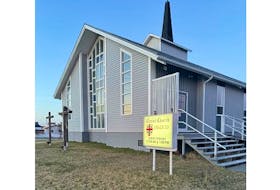While the Atlantic Salmon Federation (ASF) has recommendations for the 2018 season that would severely limit the number of salmon retained, Sid Styles maintains the organization just wants to encourage hook and release.
An ASF news release stated that Atlantic salmon returns to monitored rivers in Newfoundland and Labrador declined significantly in 2016 and 2017. An average 24 per cent drop in 2016 was followed by a further 38 per cent drop last year.
It said salmon returns were so low that DFO suspended the recreational harvest and implemented live release for conservation purposes in August 2017.
However, Styles, who is president of the Bay St. George Salmon Stewardship Group, said the federation is fully aware of what happened in Bay St. George from 1997 to 2001 when five of the best rivers in the province went hook-and-release only for those years.
He said the federation likes to refer to it now as live release but they are leaving out the fact you must drive a hook in the salmon first to play with its life before releasing it.
Styles said the mortality rate by hook and release in Newfoundland rivers during July to September is much higher than the 10 per cent permitted by DFO in waters above 18 F.
He said studies show when temperatures rise, this mortality rate rises and is fatal to salmon above 25 F.
In the release, the federation said it recognizes the contribution of all anglers to salmon conservation and supports retention angling on a river-by-river basis where it will not have a negative effect on overall populations.
However, in accordance with Atlantic Salmon Federation policy, it believes live-release angling is a better option than river closures when salmon populations are depressed. The presence of anglers helps deter illegal activity, encourages outdoor recreation, and preserves the livelihood of people working in the recreational fishery and tourism.
Styles said when the rivers are made hook-and-release only, there are less than 10 per cent of anglers on the rivers and those are basically made up of outfitters’ clients. He said that’s not effective enough to be a deterrent to poachers as proven in Bay St. George. The other 90 per cent are made up of anglers who want to retain salmon.
“Local people who have to sit on the sidelines and watch business clients angling won’t be reporting those netting the rivers,” he said.
Styles said if the federation is truly concerned about the conservation of salmon they would be doing what the Bay St. George Salmon Stewardship Group did to bring up salmon stock levels open for all anglers to fish.
He credits the declines in 2017 to the massive ice conditions, similar to what was experienced in 2007 with extreme ice that year up to June. He said last year the conditions remained to July.
Styles said the conservation levels in Bay St. George rivers are exceeding levels never seen before since DFO has been keeping records since 1953.
Atlantic Salmon Federation recommendations for 2018:
Consistent with DFO's 2017 recommendation that there be no retention until there are signs of recovery, the 2018 season should open as live release only.
A DFO led in-season review to assess the status of the stocks should occur at an appropriate time and should apply to the island of Newfoundland as well as Labrador.
In-season reviews are conducted on an annual basis.
If the in-season review indicates runs have recovered enough to support a harvest, without compromising the ability of stocks to surpass their minimum spawning requirements, rivers can be opened for harvest with a maximum of two small salmon retained per license.
Source: Atlantic Salmon Federation
Bay St. George Salmon Stewardship Group recommendations for 2018:
DFO open rivers as Class 2 (for retention of two salmon)
When in-season review is done on Harry’s River if salmon levels are to reach projects conservation levels, to open Harry’s River and Flat Bay Brook as Class 4 Rivers.
Like to see more rivers as Class 4 in Bay St. George South to allow four retained salmon.
Due to success with retention angling in Bay St. George being the result of getting people’s confidence, help and support through working with DFO, have rivers in the area open to all anglers, not just one group.
Source: Sid Styles

![['Latest News ']](https://saltwire.imgix.net/latest-news-1371411.jpg?cs=srgb&fit=crop&h=568&w=847&dpr=1&auto=compress%2Cenhance%2Cformat)







